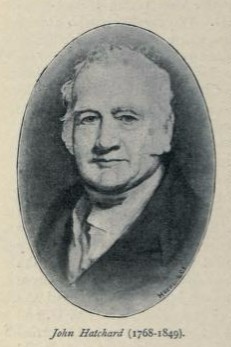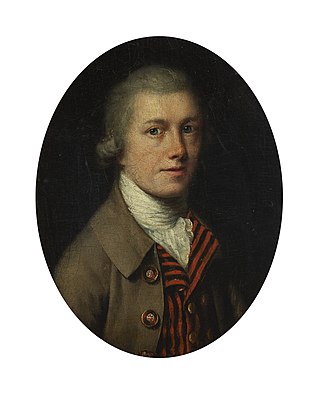Notes
Related Research Articles

Archibald David Constable was a Scottish publisher, bookseller and stationer.
Charles Rivington was a British publisher.

Joseph Whitaker was a publisher who founded Whitaker's Almanack.

Thomas Payne was an important bookseller and publisher in 18th-century London.
Peter Elmsley was an English classical scholar.
Henry Colburn was a British publisher.

The King's Bench Prison was a prison in Southwark, south London, England, from medieval times until it closed in 1880. It took its name from the King's Bench court of law in which cases of defamation, bankruptcy and other misdemeanours were heard; as such, the prison was often used as a debtor's prison until the practice was abolished in the 1860s. In 1842, it was renamed the Queen's Bench Prison, and became the Southwark Convict Prison in 1872.

Wych Street was in London where King, Melbourne and Australia Houses now stand on Aldwych. It ran west from the church of St Clement Danes on the Strand to meet the southern end of Drury Lane. It was demolished by the London County Council in around 1901, as part of redevelopment bisected by new street Aldwych, the east of which mimics its course, in a curved way so taking up land buildings stood on, and these works created Kingsway.
John Debrett was an English publisher and compiler. His name has become associated with reference books.
Thomas Adams was an English publisher. Son of Thomas Adams, a yeoman of Neen Savage, Shropshire, he became an apprentice to Oliver Wilkes, a member of the Stationers' Company in London, on 29 September 1582; he was transferred to a new master, George Bishop, on 14 October 1583. Adams himself was admitted to the company on 15 October 1583. By 1591, he had established himself as a printer based at the sign of the White Lion at St. Paul's Churchyard in the city. His business may have started when printer Robert Walley transferred ownership of a vast collection of books and ballads to Adams, but existing copies indicate that Adams had these works printed for him by others.

David Samuel Nutt was an English book publisher and seller. Operating from various locations in London, Nutt specialized in the sale of imported foreign books, catering to prestigious institutions like the British Museum and private collectors. His firm ventured into publishing in the 1830s, with a focus on foreign market publications, religious and educational texts, antiquarian literature, and scholarly works. In 1851, Nutt formed a partnership with Nicholas Trübner, a German-English publisher.
George Lackington (1777–1844) was an English bookseller and publisher.
James Edwards (1757–1816) was an English bookseller and bibliographer.
Elmsley is a surname. Notable people with the surname include:

Robert Harding Evans (1778–1857) was an English bookseller and auctioneer.
Richard Beatniffe (1740–1818) was an English printer, bookseller and the author author of The Norfolk Tour guide book.

John Elmsley was Chief Justice of Upper Canada and afterwards of Lower Canada. In both of the Canadas he served as President of the Executive Council and Speaker of the Legislative Council. During the Hunter administration, he was the most powerful man in Upper Canada. In Lower Canada, from 1802 until his death he was second only in rank to the Lieutenant Governor.

John Hatchard (1769–1849) was an English publisher and bookseller, in Piccadilly, London. The Hatchards bookshop there is still in business.
George Robinson was an English bookseller and publisher working in London.

James Sibbald (1745/47–1803) was a Scottish bookseller, publisher, journal editor, and author, active in Edinburgh. The son of a farmer, he started in life as a farm labourer, and later became employed in the shop of Charles Elliot, bookseller. In 1783 he went into the bookselling business on his own. He founded the Edinburgh Magazine and edited the Edinburgh Herald, wrote articles on antiquarian subjects, and published the Chronicle of the Poetry of Scotland (1802).
References
 This article incorporates text from a publication now in the public domain : Tedder, Richard Henry (1888). "Elmsley, Peter (1736–1802)". In Stephen, Leslie (ed.). Dictionary of National Biography . Vol. 16. London: Smith, Elder & Co. pp. 165, 166. Endnotes:
This article incorporates text from a publication now in the public domain : Tedder, Richard Henry (1888). "Elmsley, Peter (1736–1802)". In Stephen, Leslie (ed.). Dictionary of National Biography . Vol. 16. London: Smith, Elder & Co. pp. 165, 166. Endnotes: - Memoirs, 1814, pp. 408, 411).
- Gent. Mag. lxxii. pt. i. 467